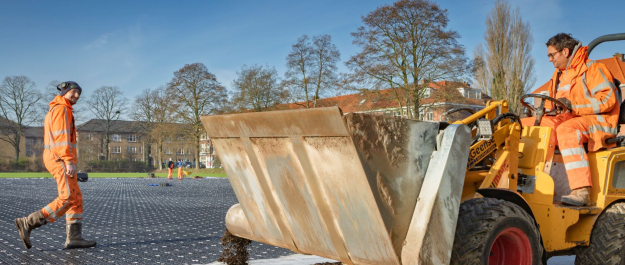During World Food Day, on 16 October, the Food and Agriculture Organization of the United Nations (FAO), will plea for a more efficient use of water. Water is essential to agriculture and food production on earth, but they account for 72 percent of global freshwater withdrawals. With water resources growing more and more scarce, the world needs to produce more food and other essential agricultural commodities with less water, FAO states.
“This is the most sustainable and most nutritious ingredient on the planet.”
White House visit
Mine Uran, founder and CEO of Alver, was invited to the White House in Washington in 2014, to discuss the future of sustainable proteins. There she realized that the growing world population urgently needs protein-rich food, produced in a more sustainable way. Soon after, she discovered the Chlorella micro-algae and together with Majbritt Byskov-Bridges she started Alver in 2016.
Green superfood of the future
Micro-algae are single-celled algae, that have been around for over billions of years, making them one of the oldest living organisms on the planet. Micro-algae are also one of the most sustainable plant-based proteins available. They grow in fresh water or can be cultivated on wet walls and they only need sunlight. The Chlorella vulgaris algae was discovered in 1890. It has a high protein and nutrient content and can be cultivated without the expense of land.
Superfood for a warming planet
Micropia, the world’s only museum of microbes, based in the center of Amsterdam, calls it the green food of the future. In the late 1940’s it was seen as the solution to the growing global food shortage, but the large innovations in agriculture and the huge increase of the worlds food production made that unnecessary. Today, with climate change and sustainability on the top of the agenda and the worlds population expected to grow to 10.5 billion people in 2050, the Chlorella algae has made a come-back as a nutrient-rich, efficient and easy-to-produce superfood.
Lowest LCA score
Compared to other protein sources, the production of the Alver Chlorella needs 99 percent less water or land and emits 97 percent less carbon dioxide, LCA (Life Cycle Analyses) calculations prove. For the production of one kilo of chicken for instance 4.325 litres of water and 12.20 square meters of land are needed and 10 kilos of CO2 is emitted. For a kilo of beef it is 1.100 litres and 36.90 square meters and 52.6 kilos of CO2-emissions. For the production of one kilo of Chlorella only 16,6 litres of water and 0,10 square meters of land are used. CO2-emssions are 1.3 kilo. It has even less impact on the environment than soya protein. “It is the most sustainable and most nutritious ingredient on the planet”, says Soleimani.
Get in the ring-award
He is leading Alvers business development in the EU markets out of its Dutch office in The Hague. Alver was invited to open an office in ImpactCity, one of Europe’s leading impact ecosystems, after being awarded as the most impactful business startup of 2021 in the ‘Get in the Ring Impact Competition’. This competition is an initiative of the Unknown Group - a early stage venture capital- and business development firm, supporting startups and scaleups, with a new headquarter in The Hague - and ImpactCity.
Together with 20 other finalists, Alver was selected out of 7500 European startups as one the most promising in the domains of food, water and energy. Majbritt Byskov-Bridges literally got into the ring to pitch Alver’s solution and business model and won. This all took place during ImpactFest, the annual flagship event of ImpactCity.
Moving to The Hague
The company is busy expanding the team and moving its entire business from Switzerland to The Hague. Alver had already outsourced production to its partner in The Netherlands. “The knowledge of the production of ingredients like micro-algae or seaweed is very high in The Netherlands. That’s why we started a collaboration with a manufacturing partner here, with Alver providing its patented knowledge and R&D”, Soleimani explains.
Later this year or early next year Alver wants to increase production capacity. To do so it is talking with investors like Invest-NL. Alver estimates the European market-size for sustainable proteins to be about 200 million euros. “We already moved all our transactions and all of our activities to the Netherlands. Our storage is currently in Germany and very soon we have another plan to move that to The Netherlands. That will be the final part”, Soleimani says.
“Golden Chlorella as a superfood and functional ingredient is revolutionising the modern food manufacturing processes by cleaning labels and removing chemical binders such as methylcellulose and other harmful E’s from ingredient lists, in addition to its excellent nutritional values. We are currently working on healthy natural vegan sausages, burgers, fish sticks and egg replacement. Our Diamond Chlorella which is bright white is an excellent emulsifier for dairy applications, super successful because it is smooth and has no after taste. We are further scaling-up production to keep up with demand and really make a healthy and sustainable impact on our life and the planet.”
Chlorella sausages
Golden Chlorella food is an additive. It can be used to make vegan burgers, steaks, sausages or other alternatives for meat.







